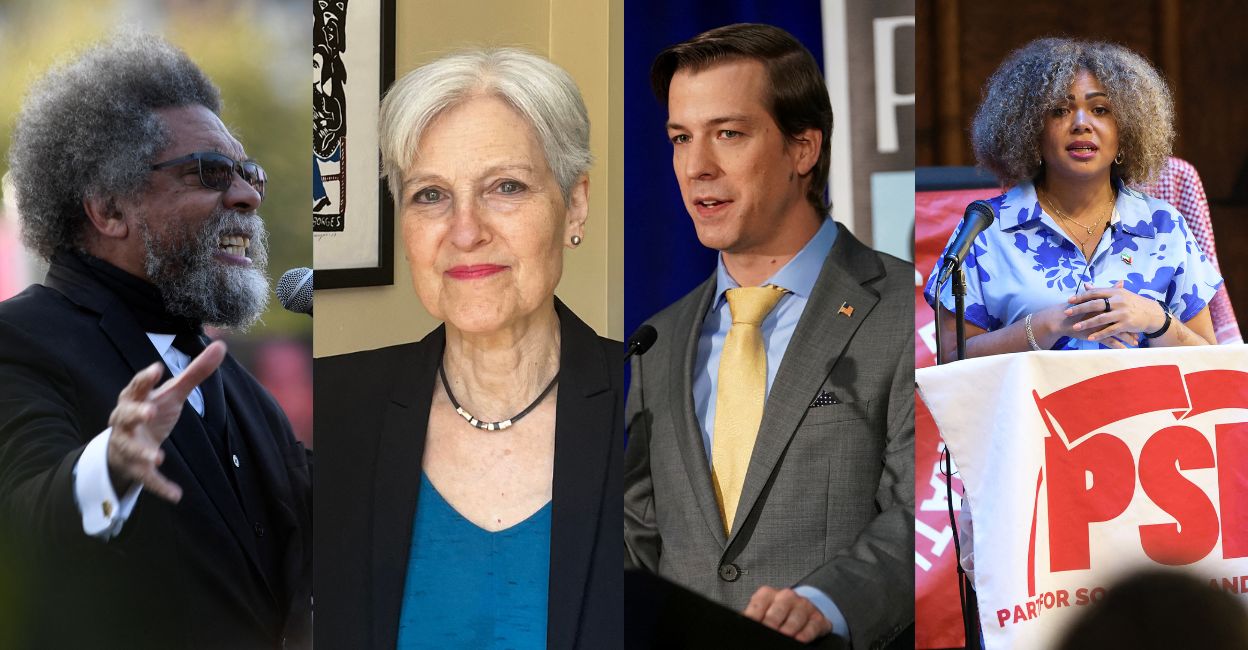If you think that the 2024 US presidential election is all about Kamala Harris and Donald J Trump, you've got it wrong.
While the race to the White House is essentially between Harris, the US vice president who is running as the Democratic nominee, and former President Trump of the Republican Party, they are not the only candidates in the fray. Those who have booked a space on the ballot as third-party or independent candidates include a philosophy professor, a physician and a left-leaning career politician. While their influence may be minimal, history tells us the so-called minor nominees should not be taken lightly. They are:
Cornel West (Independent)
Known as a public intellectual and philosopher, West has taught at Yale, Princeton and Harvard universities and is currently a professor of philosophy at Union Theological Seminary. He was a sharp critic of former President Barack Obama. The 71-year-old is affectionately called as Brother West by his followers.
His decision to contest comes at a time which he describes as “a national crisis of moral bankruptcy and spiritual obscenity driven by a derelict duopoly of both major parties that equally places profits over people and the planet.” He asserts that running as an independent candidate affords him the opportunity and duty to deliver policy prescriptions incorporated by and for the people, instead of political parties beholden to corporations and special interest groups who feel no solidarity with poor and working-class people of all races, gender identities, and age groups, his website says.
West had said that he would run as a nominee of the People’s Party, a third party led by a former campaign staff member for Senator Bernie Sanders. Subsequently he said he would seek the Green Party’s nomination, but ended up as an independent. 'The Cornel West for President' campaign has been focussing on states such as Illinois, Indiana, Michigan, Missouri, New York, Ohio, Pennsylvania, West Virginia and Wisconsin which are considered to be part of the Rust Belt. These states were part of the manufacturing centre of the US.
Jill Stein (Green Party)
Jill Stein, a physician by profession is running for president on the Green Party ticket for the third time after her unsuccessful bids in 2012 and 2016. In a video announcing her campaign, she called for an “economic bill of rights” that would include a guaranteed right to employment, health care, housing, food and education. She is also a staunch supporter of combating climate change and protecting abortion and transgender rights.
Chase Oliver (Libertarian Party)
Chase Oliver is a left-leaning member of the Libertarian Party which promotes civil liberties, non-interventionism, laissez-faire capitalism, and limiting the size and scope of government.
He used to be a Democrat. Oliver became politically active as an opponent of the Iraq War and describes himself as “armed and gay.” He opposes Israel’s actions in Gaza and wants to abolish the Federal Reserve. He previously ran for Senate in Georgia in 2022, and received about 2 per cent of the vote.
Claudia De la Cruz (Party for Socialism and Liberation)
A socialist, Claudia De la Cruza runs on the ticket of the Party for Socialism and Liberation. She is known for her organising skills. A pastor in the United Church of Christ, she has also co-founded the People’s Forum, a facility in New York that describes itself as a “movement incubator for working class and marginalised communities.”
She is an advocate of a single-payer health care, reparations for Black people and cutting a majority of the military budget.
Insignificant or spoilsports?
The role of the third party or independent candidates has been limited as advocates of the causes they stand for in the past many elections. However, that has not been the case always.
In 1992, Ross Perot, a billionaire businessman from Texas who ran against Republican President George HW Bush and his Democratic challenger Bill Clinton was able to garner 18.9 per cent of the popular vote. It remains the best performance by a non-major-party candidate since Theodore Roosevelt won 27.4 per cent as progressive Party nominee in 1912.
In the 2016 election, two non-major candidates had received considerable attention: the Libertarian Party nominee and former New Mexico Governor Gary Johnson Green Party’s Jill Stein. Johnson polled 3.3 per cent of popular votes while Stein had to settle for 1 per cent with around 1.4 million votes. She was blamed by a section of Democrats for playing spoilsport for their candidate Hillary Clinton in critical states.
The best performance by a third party candidate in the 2020 presidential race was by Libertarian Party’s Jo Jorgensen who polled 1.18 per cent.











